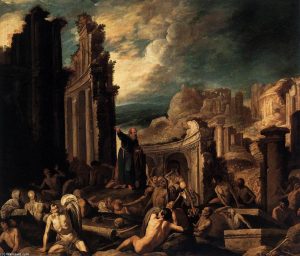Ezekiel prophesies among the Jewish exiles in Babylon during the last days of Judah’s decline and downfall. His ministry is in some ways similar to that of his older contemporary, Jeremiah.
But while Jeremiah delivers a chilling message of destruction in Jerusalem, Ezekiel brings a warming message of reconstruction in Babylon.
Jeremiah is a man of tears, Ezekiel is a man of visions.
Join us as we look at what his visions reveal to us about God’s judgment, righteousness, and mercy.

Fancisco Collantes 1630 painting of “The Vision of Ezekiel” depicts the prophet in a region known as Tel Aviv (likely not our present day Tel Aviv) melds a lot of the account, including the valley of dry bones. At God’s command, the bones will rise up and live in reference to God’s people and a foretaste of God, through the person and work of Jesus Christ our Lord raising the dead.
And those visions stretch from horror to hope; from condemnation upon Judah’s faithless leaders and godless foes, to consolation regarding Judah’s future.
Through it all, mankind would see the glory of Israel’s sovereign God, and “‘they shall know that I am the LORD’” (6:10). (1.)
Format:
A helpful way to look at the book of Ezekiel, in broad strokes, includes:
- Renouncing the Jews
- Prophecies against enemy nations
- Prophecies after Jerusalem’s destruction
- Prophetic visions bound to Revelation
Outline:
- Ezekiel’s call to the prophetic office (Ezekiel 1:1-3:21)
- Prophecies of denunciation against the Jews (Ezekiel 3:22-24, Ezekiel 4:1-3)
- Prophecies against various surrounding nations:
- The Ammonites (Ezekiel 25:1-7)
- The Moabites (Ezekiel 8-11)
- The Edomites (Ezekiel 12-14)
- The Philistines (Ezekiel 15-17)
- Tyre and Sidon (Ezekiel 26-28
- Egypt (Ezekiel 29-32)
- Prophecies delivered after the destruction of Jerusalem by Nebuchadnezzar: the triumphs of Israel and the Kingdom of God on earth (Ezekiel 33-39), Messianic Times, and the establishment and prosperity of the Kingdom (Ezekiel 40-48)
The closing visions of the book are referred to in the book of Revelation:
Ezekiel 38 – Revelation 20:8
Ezekiel 47:1-8 – Revelation 22:1-2
Other references to Ezekiel:
Ezekiel 36:2 XR Romans 2:24
Ezekiel 20:11 XR Romanis 10:5, Galatians 3:12
Ezekiel 12:22 XR 2 Peter 3:4
Ezekiel is singular in the frequency with which he refers to the Pentateuch (e.g., Ezek. 27; 28:13; 31:8; 36:11, 34; 47:13, etc.).
He shows also an acquaintance with the writings of Hosea (Ezek. 37:22), Isaiah (Ezek. 8:12; 29:6), and especially with those of Jeremiah, his older contemporary (Jer. 24:7, 9; 48:37). (2.)
General Observations
Jeremiah, Zechariah, and Ezekiel were the only prophet-priests (3.)
Ezekiel’s prophetic ministry spanned about 22 years (593-571 BC), from age 30 to 52. Before Jerusalem fell, Ezekiel’s message focused on Judah’s forthcoming destruction because of her sin. After Jerusalem’s fall, Ezekiel’s message centered on Judah’s future restoration. (4.)
Ezekiel is the only major prophet with such a precise chronological arrangement (5. dyer 1226)
Structure:
- Chapters 1-24 = judgment of Judah
- Chapters 25-32 = Judgment of Gentiles
- Chapters 33-48 = restoration of Judah
God’s Glory and Name
Ezekiel emphasizes God’s glory and character; both feature prominently in the book bearing his name.
Ezekiel 1:26-2:24
Consider:
- 15 times God speaks that He acted for His name’s sake.
In recent times, it seems the believer in Christ in the West is obsessed with self. Christianity is horizontal, when we should be more concerned about God. He does things for His name’s sake.
He doesn’t forgive us to make us feel better. That’s a wonderful benefit, but He forgives us for His reputation.
- 60 times the Word of the Lord
- 67 times God intervened so that people would know *that I am the Lord
- 126 times Thus says the Lord
- God speaks. Do we listen? When God says something, it’s not up for debate. It’s the Word of the Lord.Ezekiel 38:23
- There are 93 references to the Son of Man, more than any other book in the Bible. בֶּן־אָדָם ֙(Hb. Ben Adam).
By now in our study it comes as no surprise that God’s prophets are calling God’s people to account. Rarely do we read a prophet’s commendation or praise of the people doing well.
- 157 times Land is mentioned
Ezekiel is another prophet in the line who warns that judgment is imminent. Every prophet had a horrific task, but we have hard insight into Ezekiel: Ezekiel 3:12, Ezekiel 3:14, Ezekiel 3:16-22
Notice God’s message to Ezekiel:
- Ezekiel, deliver my word or die.
- Ezekiel, if they don’t turn from their ways, they’ll die.
- Ezekiel, if they turn from their ways, they’ll live.
Ezekiel’s visions from God reveal to him God’s glory leaving the Temple, which had become corrupt, immoral, and polluted.
While God’s people will be dispersed into exile, He will not completely abandon them.
Lessons
- God is faithful to His faithless people.
- God is holy when His people are yet unholy.
- God’s judgment brings God’s righteousness and mercy.
- God will judge His shepherds.
- God’s glory departs – yet God’s glory will return.
- God is patient toward His people.
- God’s land is as sure as His word.
Resources:
- Bruce Wilkinson and Kenneth Boa, Talk Thru the Bible(Nashville: T. Nelson, 1983), 212.
- M. G. Easton, Easton’s Bible Dictionary(New York: Harper & Brothers, 1893
- Charles H. Dyer, “Ezekiel,”in The Bible Knowledge Commentary: An Exposition of theScriptures, ed. J. F. Walvoord and R. B. Zuck, vol. 1 (Wheaton, IL: Victor Books, 1985), 1224–1225
- Dyer 1226

